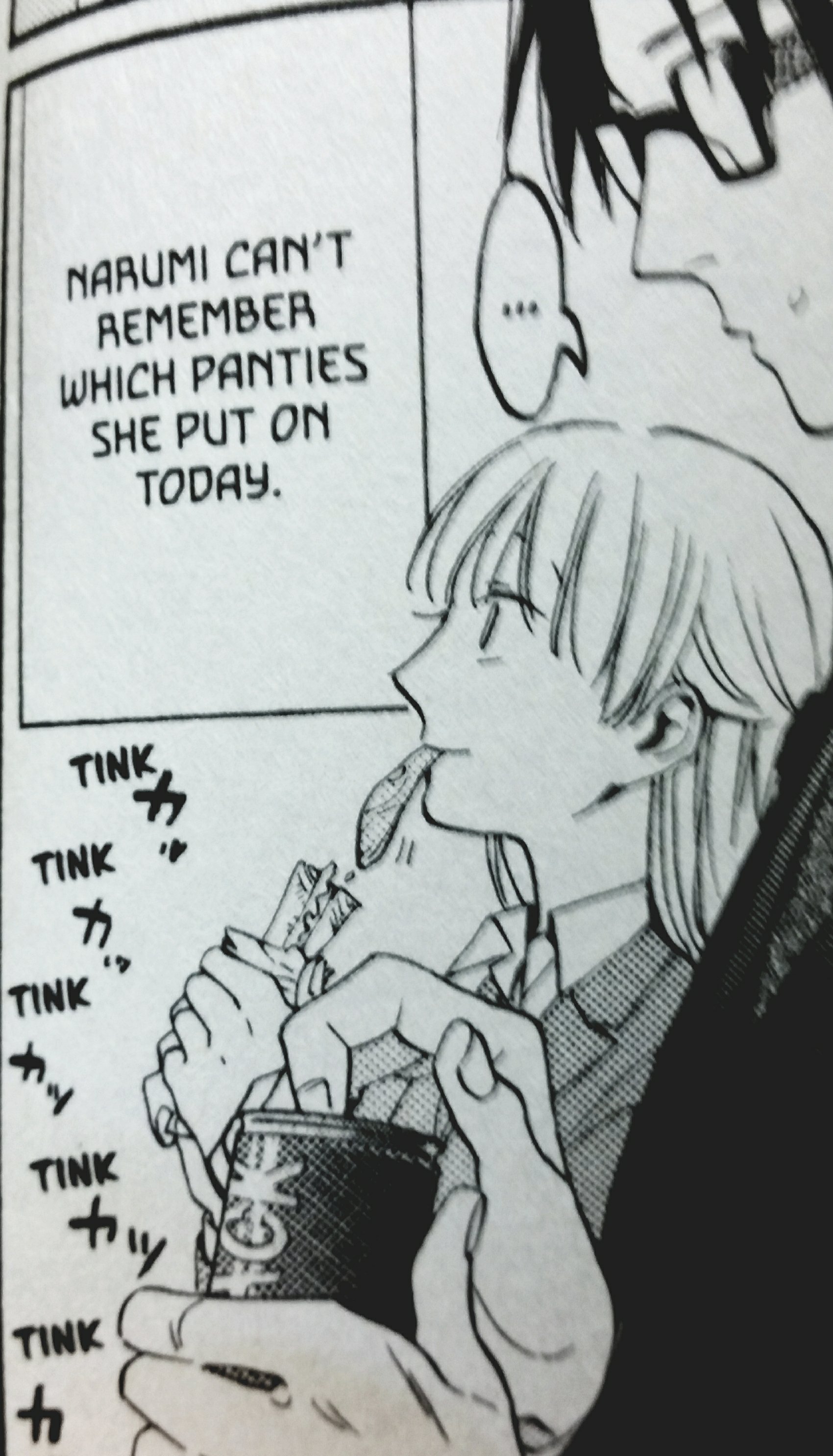It’s that time of year again, where every single nerd news site tells you what the best-of-the-best comics of the year are. I’m always wary of trying to make blanket statements about literature, but I did want to share a few of my favorites from this past year. I’ve done a LOT of reading, and I feel as though I’ve branched out more than usual (or more like, there have been more titles in Western comics that have appealed to me than there have been in the past).
I didn’t give myself a limit to the number of books I chose, nor any kind of guideline as to theme, tone, etc. I just picked the ones I felt strongly about! These are listed in roughly the order I read them in, and by no means in order of quality. They’re all top-notch, anyway!
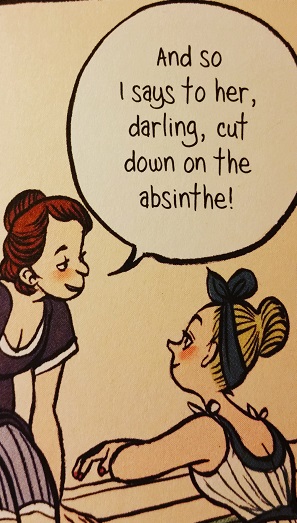
The Prince and the Dressmaker, by Jen Wang
Prince Sebastian has a BIG secret: sometimes he likes to wear dresses and go out on the town as Lady Crystallia. In addition to keeping this part of himself hidden from Parisian society, he has to deal with his parents determinedly seeking out a bride for him. Enter Frances, an extremely skilled seamstress with dreams of fashion design whom Sebastian employs to outfit him for all occasions, public and secret. The story of these two growing together and learning to be their best selves is captured incredibly in Wang’s bright, flowing artwork. Plenty of humor helps to balance out the heart-rending moments that remind the reader to never lose sight of the things that make them unique.
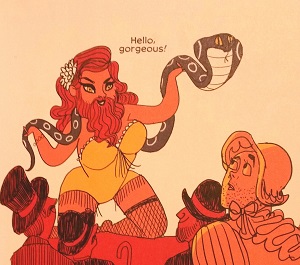
Brazen: Rebel Ladies Who Rocked the World, by Pénélope Bagieu
I genuinely did not expect to adore this book as much as I do. I’m not well-versed in the non-fiction graphic novel, and I’m often suspicious of cheery, pink-emblazoned “girl power” books — not because I don’t believe in girl power, but because it’s hard to encapsulate in one book what it is about womanhood that is so unique. That said, I was truly fascinated and enthralled by the stories that Bagieu, in her whimsical style, has presented in this hefty tome of awesome and awe-inspiring women. Women from all backgrounds, in all types of careers, with differing needs and goals, and with all sorts of romantic entanglements and personal dramas, are presented for the reader with reverence, joy, and good humor.
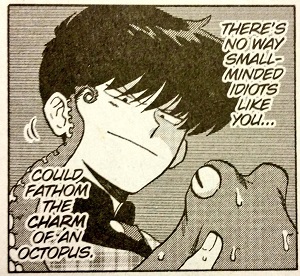
Go For It, Nakamura!, by Syundei
I have been seriously reveling in the increased publication of good, sweet, not-super-fetishistic BL manga this past year or so. In this exquisite example, young Nakamura knows for sure that he’s gay, and also knows for sure that he’s in love with his classmate, Hirose. The problem is, he doesn’t even know how to become friends with Hirose, never mind try to ask him out! Between caring for his pet octopus, perusing questionable BL for romance tips, and just generally trying not to act overly weird, will our stalwart hero ever secure Hirose’s friendship? A familiar story for anyone who was shy in high school, Go For It, Nakamura! uses awkwardness, hilarity, and genuine heart to create a sweet and fuzzy one-shot that will make you yearn for more. Syundei’s artwork is adorable, and very reminiscent of that of manga powerhouse Rumiko Takahashi.
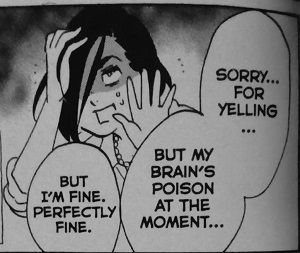
Tokyo Tarareba Girls, by Akiko Higashimura
I wrote about my initial reaction to volume one of Akiko Higashimura’s forays into 30-something woman angst back when the print version first came out. The series is now three print volumes in (with all volumes available digitally), and it has not stopped being maybe the most anticipated title in my pull at work. Higashimura’s ability to poke fun at the stupidity of a woman’s society-bred anxieties while treating the same character with sympathy and understanding is so incredible to me. I often find it hard to articulate what it is that makes this series so good, because it’s really everything. Please…I don’t often make demands, but read Tokyo Tarareba Girls.
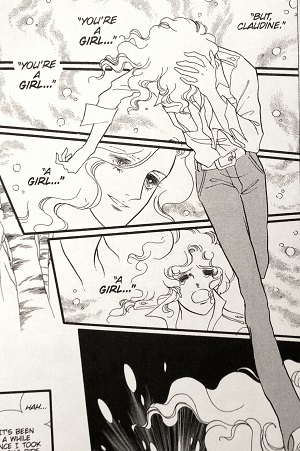
Claudine, by Riyoko Ikeda
I find this manga hard to recommend, even though I love it. It is a quick read; I read it from start to finish on my half-hour bus ride home from work one day. But it is also a dramatic and sad read, in true 70s shojo fashion. Our protagonist Claudine is assigned female at birth, but knows in his heart that he is a man. Even his own father embraces Claudine as more of a son than a daughter, going riding with him and treating him like his older brothers. Society in early 20th century France, however, is not as kind. To the rest of the world, Claudine is a girl, and the tragedy here lies in the outmoded concept that any woman he might love will never lead a fulfilled life with a “woman” partner. So in many ways, this is a fantastic achievement, being a trans story from 70s Japan; but it is also a story about a trans man from the perspective of a cisgender woman, writing at a time when shojo manga was about deep, dramatic personal struggles and utilizing queerness as a vehicle for those struggles. If you can go into it with the understanding that it is a sad story (and yes, I did cry on that fateful bus ride home), it is a simply gorgeous and heartbreaking work of tragedy.
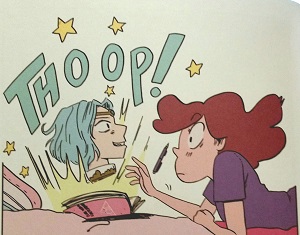
Making Friends, by Kristen Gudsnuk
I’ve been in love with Kristen Gudsnuk’s work ever since I read the first issue of Henchgirl, back when it was released by Scout Comics. Her artwork is fun, her dialogue is funny, and she makes plenty of obvious anime references that I feel are speaking directly to me and my sense of humor. So of course I was thrilled when Making Friends came out, and I was not disappointed. Protagonist Dany is starting middle school, where she is separated from her friends and everything that was familiar to her. She turns inward and begins to draw in the sketchbook she recently inherited from her recently deceased great-aunt. Soon she discovers that anything she draws in the sketchbook — including the head of her favorite anime badboy — comes to life! She quickly devises a plan to create a new, perfect best friend. But as we all know, magic has serious consequences, and Dany is going to have to figure out how to fix the mess she’s made. Gudsnuk does an excellent job of keeping this story about friendship and responsibility from becoming saccharine or tropey, instead treating every character with equal weight and relying on her uncanny knack for coming at a story from a slightly sideways perspective.
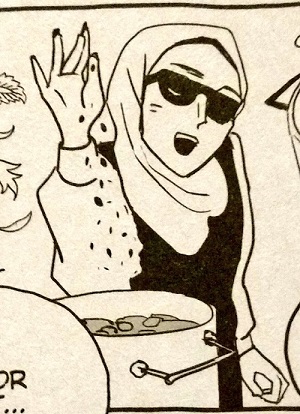
Satoko and Nada, by Yupechika and Marie Nishimori
This was absolutely one of my most anticipated titles of the year, and man oh man did it hit a home run for me. Upon initially receiving it I was uncertain, as it is laid out in 4-koma format, which I usually find cute but not particularly compelling. And yet in this easy gag style, with simple illustrations, Satoko and Nada manages to be a profoundly intimate story of friendship between women and across cultures. Nada is a college student from Saudi Arabia who is looking for a roommate. Satoko, a student in the same school, has recently arrived from Japan and chooses to become that needed roommate. Thus begins this tale of two people from very different backgrounds as they live together and learn all about each other and about their multicultural friends. Warm-hearted, informative, and full of meme references, this manga really surprised me in the best possible way. I want everyone to read it!
(Just an honorable mention here: I reread two of my absolute favorite series this year: Pet Shop of Horrors, by Matsuri Akino, and The Wallflower, by Tomoko Hayakawa. One day, I’d like to write at length about both of these series, but as they’re old and hard to find, I opted against adding them to this list. Look forward to an analysis of them one day, because I am very attached to them both!)
As you can see, I read a lot of very heartwarming stories by or about women this year. I have been immensely impressed by the range in stories and creators I’ve had access to, and that’s something I want to see continue to grow year by year. My reading list has been a bright spot in what has been a very tumultuous year otherwise (personally and in the world at large), and it gives me hope that more differing voices are being tapped to tell more and varied stories.
Looking forward to reading more in 2019!
josei
Tokyo Tarareba Girls & the Fear of Feeling Unwanted
Just a couple weeks ago, I talked about how much I had been enjoying the Wotakoi manga, and how I yearned for more josei manga that centered around the relatable struggles of women’s everyday lives. I had forgotten that the print edition of Akiko Higashimura’s Tokyo Tarareba Girls would be coming out so soon, and it is another shining example of exactly what I’ve been looking for.
I want to preface the meat of my review by saying that I am very different from the story’s protagonist, Rinko. I am 28 years old, happily married, and while I’m still trying to figure out my career, I am at least heading in a direction that feels fruitful. And even if all that weren’t the case, I very strongly do not ascribe to societal ideas about appropriate ages to marry, have children, etc. But a lot of women do, and that external pressure can be suffocating.
Rinko, at 33, is an established screenwriter for various webseries dramas. She is not only unmarried, but has also not really been dating for quite some time. Our story starts with her 33rd birthday and the announcement that Tokyo will be hosting the 2020 Olympics. Suddenly, she feels that she doesn’t want to remain unwed once the Olympics start, so she’s given herself a deadline to find a husband.
The only problem is, she’s not working particularly hard to meet anyone new! She hopes that a man she works with who had shown interest in her ten years previously might be interested again, but he has moved on to her much younger, pink-haired coworker, leaving Rinko feeling old and unwanted. At the pub she and her friends frequent, they encounter a rude young man who tells them plainly that they’re wasting time getting drunk, and that their activities are less like a “girls’ night,” and more like an “old maids’ gossip circle.” He is the one who first calls them “”what-if” women, and while he’s extraordinarily rude, something about his words rings true for Rinko. When he shows up to audition for one of her dramas and complains about the script, she loses her position on that series and begins to truly feel that she is unwanted.

And this, for me, is what Tokyo Tarereba Girls is about: the fear of being unwanted once you are no longer young, pretty, and willing to please. There is an insidious idea that women are no longer interesting once they become — pardon my language — unfuckable. In fact, Rinko loses her position to a younger woman who she discovers is sleeping with the producer, causing Rinko to spiral into a deep depression. At the close of the first volume, the rude young model/actor, Key, offers her a way to get ahead.
Tokyo Tarereba Girls has been available in English digitally through Kodansha for some time now, so I’ve seen a fair amount of single panels or discussions of its message and meaning (without completely spoiling myself, of course). It is my feeling that the story will go on to redefine Rinko’s position that she needs to be married to one where she learns to focus on herself and her goals, without buckling to outside pressure. At least, that’s what I hope!

In many ways, Tokyo Tarereba Girls isn’t a happy story. So many women (and I’m sure folks of other genders, as well) feel adrift in a sea of societal expectation. There are so many thinkpieces out there on millennials “choosing” not to buy houses or have children; even if you have no interest in bending to the whims of society, it’s hard to avoid acknowledging that you don’t tick off certain boxes. And yet, Higashimura delivers this anxiety wrapped in the sense of humor that set Princess Jellyfish apart before; there is no attempt to show Rinko and her friends as beautiful paragons of virtue who are underserving of their fate. They are all normal women, with normal lives and normal stresses. They are crass and selfish, women who we might not want to be, but who we recognize in ourselves and in our friends and family.
It is tempting to claim that women like Rinko, who obsess over age, desirability, and the perceived expectations of others, are silly and shallow. Indeed, it is not uncommon to see this kind of criticism even coming from other women. So it was rather refreshing to see, at the back of this first volume, Higashimura’s own beliefs about marriage — essentially, that she fell into it by accident and that she doesn’t put too much weight on its merits. She has pushed back against her friends for their own fears, encouraging them to eschew their anxieties and just live their lives…but then she has also crafted this story highlighting those very real anxieties. She cannot relate to her friends in real life, but she can understand the concerns they have enough to show readers their value.
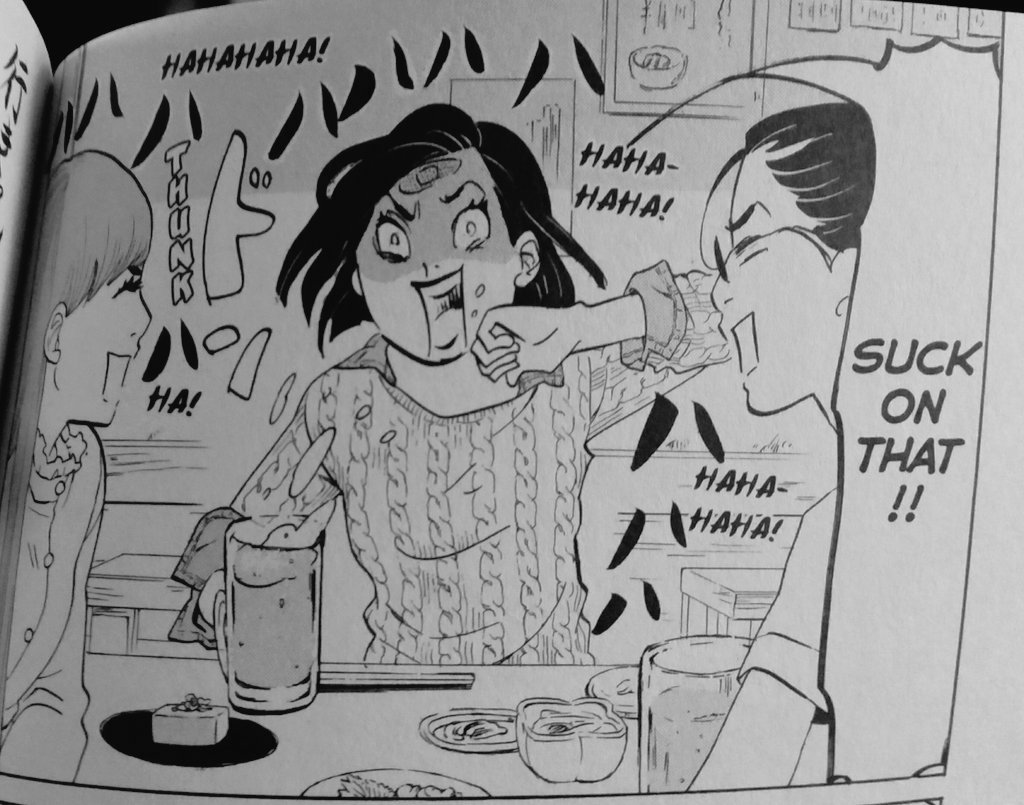
Since manga began legal English-language circulation, there have always been stories centered around adult men and their struggles and fantasies. It is gratifying to know that the girls and women who facilitated the huge manga boom of the late 90s and early aughts now have manga that have grown up with them, with protagonists their age who also may feel adrift, alone, and unwanted as they age and change. I believe that the manga market is ready for more josei and has been for a while now.
Because I’m terrible at keeping up with digital releases, I’m looking very forward to continuing Tokyo Tarareba Girls as it comes out in print. I know that she’s been acknowledged extensively in Japan, but I really hope to see Akiko Higashimura recognized for her genius in the North American market. To that end, I encourage everyone to try her work, whether it be this or Princess Jellyfish. She captures the struggle of being a woman from so many different perspectives and with such sensitivity, without sacrificing either wit or drama. She truly is a spectacular creator.
Romancing the Nerd; or, Wotakoi Is Actually As Good As Everyone Says
I had a good manga week this week! I’ve been doing a lot of reading in general (I’ve been devouring novels at an alarming rate lately), and I was glad that I have had such a high rate of success with the quality of my choices. I started going through the Ranma 1/2 manga finally, and the new Captain Harlock Classic Collection came out, as well. I’m very pleased.
But you’re all here to read about my thoughts on Wotakoi, which are basically: I love it.
I have a conflicted relationship with hype. I don’t want to be a curmudgeon who doesn’t engage with things because they’re talked about a lot, but I also find that a lot of what is most popular is completely uninteresting to me. And as I’ve said before, I’m not fond of being told to engage with something because I “should,” as opposed to because the person recommending it is taking my tastes into account.
But I had seen many people whose opinions I trust mention how much they’re enjoying both the anime and the manga, and since volume two had just hit the stands this week, I thought I’d give it a go. I’m glad to admit that I’ve boarded the hype train completely!
I’m constantly craving more josei manga, ones that can acknowledge that the core group of North American manga nerds from the late 90s into the aughts are now adults who may still enjoy their shonen romps every now and then, but would really like something that reflects their own experiences a little bit. Shojo romances are all well and good, but I’ve been out of high school for over a decade now, and frankly I don’t want to relive my teenage years, thanks.
Along comes Wotakoi. Our main character, Narumi, is your typical office worker with a dark secret: she’s an otaku! Honestly, she’s the only one who thinks it’s a dark secret, and her core group of work buddies are all also immersed in their own nerdy ventures: video games, manga, cosplay, etc. Her childhood friend, Hirotaka, offf-handedly asks her if she’d like to date him since she wouldn’t have to hide her otaku lifestyle from him. And thus our office romance begins!
I love romantic comedies. I think really good ones are hard to come by, but when you get a story that’s got all the right beats of both comedy and romance…man, that’s the stuff. I also love manga that are self-aware. I have thus far enjoyed Kiss Him, Not Me for this reason; it’s a kind of unflattering glimpse into fujoshi life, written by a fujoshi, for fujoshi. Wotakoi hits those similar marks, but ultimately is more sophisticated in its delivery.
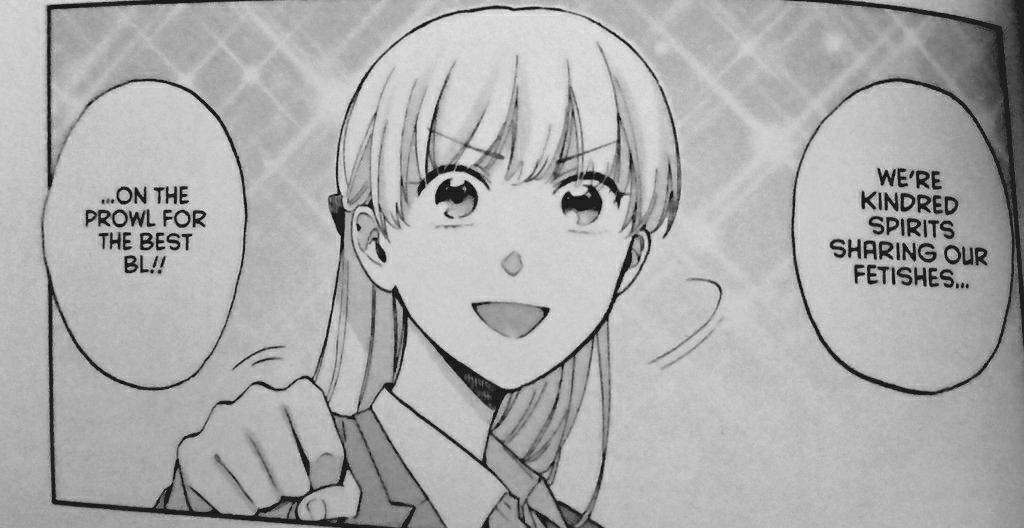
The comedy is heavy in the manga, which makes the touching romantic moments stand out all the more. And the mangaka, Fujita, isn’t overly precious about those moments. Narumi is pretty clueless about both her own feelings and those of Hirotaka, but in a way that feels genuine as opposed to frustratingly ditzy. She and Hirotaka have been friends forever, so their relationship is already rock-solid, their trust already established. She relies on him to keep her grounded, and enjoys his company regardless of their new dating status. I’ve always been a firm believer in friendship being the cornerstone of any romantic relationship, so I love the way theirs develops.
I don’t want to give too much away, but from the first two volumes alone, it appears that I’ll be getting my fill of wacky antics, nerdy in-jokes, heart-rending backstories, and genuinely moving romantic gestures. I’m grateful for a series that recognizes the growth in my tastes, but also the state of my concerns as an adult woman. With the anime streaming right now, I hope that the manga becomes the success it deserves to become and thus ushers in a new wave of licenses for the modern otaku lady and her modern lady concerns!
